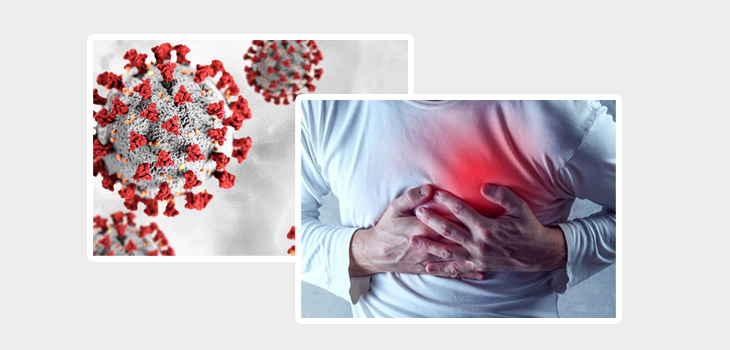
Coronavirus disease 2019 (COVID-19) is a global pandemic caused by the Severe Acute Respiratory Syndrome Coronavirus-2 (SARSCoV-2). As of May 7th2020, infected patients were present in 167 countries/regions around the world and there were more than 3,85,000 cases worldwide with nearly 2,68,000 fatalities. COVID-19 interacts with cardiovascular system on multiple levels;
First, those with COVID-19 and pre-existing cardiovascular disease have an increased risk of severe disease and death.
Second, COVID-19 infection can cause acute myocardial injury, myocarditis, arrhythmias, and venous thromboembolism.
Third, therapies for COVID-19 may have serious adverse cardiovascular side effects.
Fourth, the response to COVID-19 can compromise the treatment of patients with cardiovascular conditions.
Finally, the provision of cardiovascular care may place health care workers at a high risk of contracting the virus
CLINICAL PRESENTATION:
SARSCoV-2 is spread predominantly via respiratory droplets, but also can be aerosolized or detected in the stool. Transmission may occur from both symptomatic and asymptomatic patients, with secondary infection rates ranging 0.5-5%. The median incubation time is 4-5 days and 97.5% will experience symptoms within 11.5 days of exposure. Reports from China demonstrate that a significant majority of patients (81%) had mild symptoms (no pneumonia or mild pneumonia) from COVID-19.
Among those with more significant symptoms, 14% experienced severe symptoms (dyspnea, respiratory rate ≥30/min, blood oxygen saturation ≤93%, partial pressure of arterial oxygen to fraction of inspired oxygen ratio 50% within 24 to 48 hours) and 5% were critical (respiratory failure, septic shock, and/or multiple organ dysfunction or failure).
COVID-19 IN PATIENTS WITH PRE EXISTING CARDIOVASCULAR DISEASE (CVD):
A meta-analysis of 6 studies inclusive of 1,527 patients with COVID-19 reported the prevalence of hypertension, cardiac and cerebrovascular disease, and diabetes to be 17.1%, 16.4%, and 9.7%, respectively. . Patients who required ICU admission were more likely to have these comorbidities than were non-ICU patients. Age is the strongest risk factor for CVD and the effect of aging on immune function may be equally important for COVID-19 susceptibility and severity. Patients with hypertension and CVD have higher expression of ACE2 enhancing susceptibility to SARS-CoV-2, although the data are conflicting.
CARDIOVASCULAR SEQUELAE ASSOCIATED WITH COVID-19.
COVID -19 Infections can cause MYOCARDIAL INJURY, MYOCARDITIS AND ACUTE CORONARY SYNDROMES. Myocardial injury, as defined by an increased troponin level, can occur due to myocardial ischemia or nonischemic myocardial processes including myocarditis. The profound inflammatory response, hemodynamic changes and Hypoxia associated with severe disease may confer risk for atherosclerotic plaque rupture in susceptible patients Cardiac arrhythmias are another common CV manifestation described in patients with COVID-19 infection. High prevalence of arrhythmia might be, in part, attributable to metabolic disarray, hypoxia, or neurohormonal or inflammatory stress in the setting of viral infection in patients with or without prior CVD. Heart failure, cardiogenic or mixed shock, ARDS /acute pulmonary edema, venous thromboembolic diseases are also reported with COVID-19 infection.
DRUG THERAPY AND COVID-19: INTERACTIONS AND CARDIOVASCULAR IMPLICATIONS
Although currently there are no specific effective therapies for COVID-19, various pharmacologic agents are under active investigation. As these drugs are being studied, it is important to review the potential CV side effects and interactions with other CV medications. Chloroquine and the closely related hydroxychloroquine have the potential for intermediate to-delayed myocardial toxicity, risk of torsade des pointes in patients with electrolyte abnormalities or with concomitant use of QT-interval– prolonging agents. Short-term exposure to these agents, as would be expected in treatment of COVID- 19, confers lower risk of these dose dependent side effects. Remdesivir is an investigational drug, now being studied in patients with COVID-19. Although extensive CV toxicities and medication interactions have yet to be reported, it may cause profound hypotension and cardiac arrest. Patients with severe COVID-19 may pose challenges in administering routine CV medications, ranging from antiplatelet therapy to beta-blockers, thus putting patients with ischemic heart disease or heart failure at risk of further deterioration of their clinicalcondition.
The COVID-19 pandemic has affected hundreds of thousands of patients and poses a major health threat on an international scale. I would strongly urge all cardiac patients to follow basic preventive measures such as social distancing, hand washing and prudent use of masks to prevent contracting the disease and avoiding any adverse outcome.

DR.MIDHUN KUMAR, MD (GEN.MEDICINE), DM (CARDIO), DNB (CARDIO)
CONSULTANT CARDIOLOGIST
DR. MEHTA’S HOSPITALS
